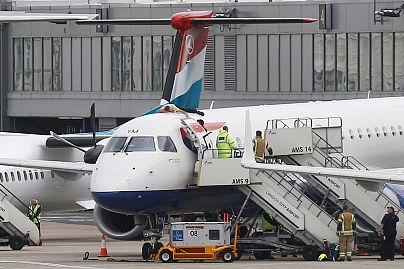Extinction Rebellion is a social movement that uses nonviolent civil disobedience to draw attention to the climate crisis.
Pledging to use non-violent civil disobedience as a weapon to wage their battles, Extinction Rebellion began in 2018.
 ADVERTISEMENT
ADVERTISEMENT
 ADVERTISEMENT
ADVERTISEMENT
They attracted more than 1,500 people to London's Parliament Square where they first declared a 'rebellion'.
Since then, the social movement has spread rapidly throughout the world, organising protests in over 70 countries.
In protests that began on October 7, London's Metropolitan Police said that at least 1000 people had been arrested in London.
Euronews takes a look at this international movement.
What is Extinction Rebellion?
It is a self-described international social movement that uses civil disobedience to pressure governments to take action on the "climate and ecological emergency".
"Campaigning as usual hasn't worked, and so we are using non-violent civil disobedience. We are disrupting roads; we are occupying sites so that our voices are heard and so that governments take action," said Extinction Rebellion political strategist Ronan Harrington told Euronews.
It was first launched in 2018. A crowd of more than 1500 people gathered in London's Parliament Square and announced a "Declaration of Rebellion" against the UK government.
The decentralised and volunteer-led organisation encourages people to set up local groups in their towns. They organise large scale protests and actions through WhatsApp and Telegram.
What is the social movement's goal?
The group has three demands in the United Kingdom, where they were founded: for the government to declare a "climate and ecological emergency", for the government to halt biodiversity loss and reduce greenhouse gas emissions to net-zero by 2025, and for the UK to create and listen to a Citizens' Assembly on "climate and ecological justice".
The idea is to have citizens consult with governments on the issue of climate. Extinction Rebellion has even created a draft bill in the UK that incorporates their demands.
The movement uses arrests as a tactic to draw attention to the cause.
"Getting arrested in a core part of the Extinction Rebellion strategy because it shows just how important this issue is," Harrington said.
"The prisons in London are now too full to cope with the amount of people being arrested," Harrington added. The Metropolitan Police told Euronews that they have not yet reached full capacity during the most recent set of protests.
Has the movement been successful?
Extinction Rebellion brought London to a standstill in April 2019, blocking key areas of the city for 11 days. The protest resulted in over 1,000 arrests.
Eleven protesters even stripped off in the public gallery at the House of Commons to address the "elephant in the room" which they said was the climate crisis.
Over the past month, protesters have sprayed fake blood on Britain's Treasury, dressed as bees in Sydney, and staged a die-in on Wall Street.
A Paralympic medallist climbed atop a British Airways plane on the runway at London City airport as part of an Extinction Rebellion protest. But despite the protests, the airport remained fully functional on Thursday.
In five British cities over the summer, the group used large colourful boats to block traffic in city centres.
In France, Extinction Rebellion made headlines after police removed protesters from the Pont de Sully bridge in Paris by dragging protesters and dousing them in pepper-spray in July.
Criticism of the movement
Extinction Rebellion was called out in an open letter published in May by dozens of grassroots groups that asked the movement to reflect on its narrative by including and recognising the struggles of people of colour and the Global South.
"Without incorporating our experiences, any response to this disaster will fail to change the complex ways in which social, economic and political systems shape our lives," the letter, written by grassroots collective Wretched of The Earth, read.
Others have criticised the group's methods as too disruptive with reports in several British newspapers of people being blocked on their way to hospitals in some cases.
New Zealand Prime Minister Jacinda Ardern commented on the protests in her country after people were arrested in Wellington.
"I am never going to be opposed to someone being able to express their opinion and express their voices," she said. "But, in blocking people from being able to go and do their day to day job, doesn't necessarily take us any closer to the climate action that they are calling for."
"We don't want to be disrupting people, we don't want to stop them from getting to work. But sometimes an issue is so grave and that all you have left are these means to get attention that it's justified," Harrington said.











